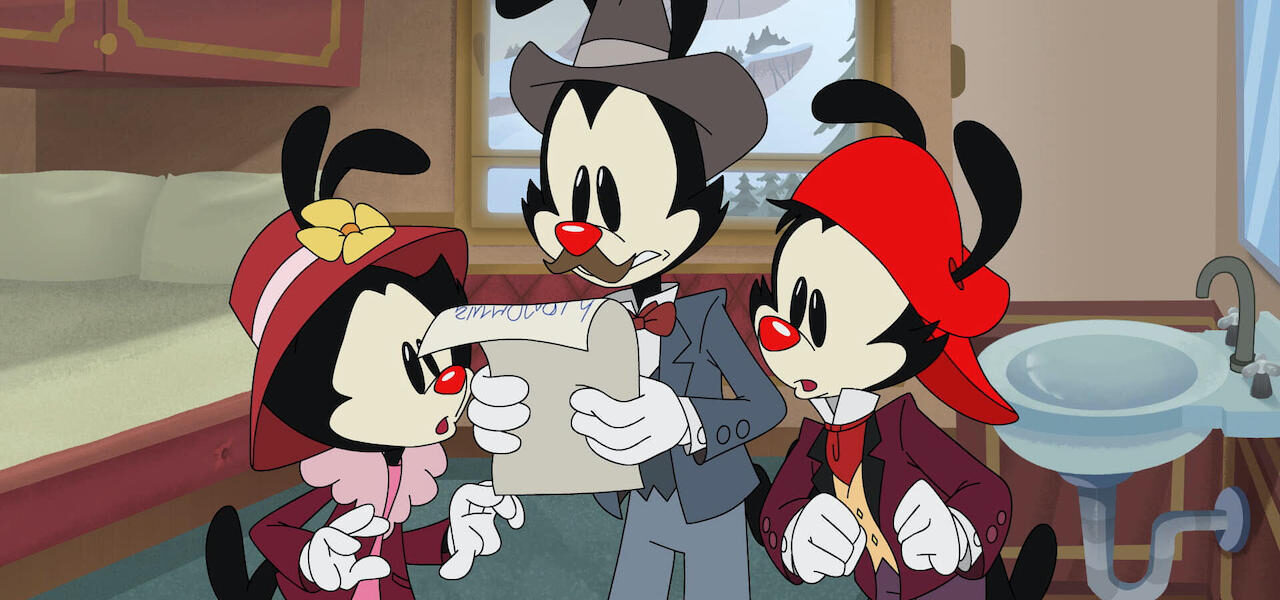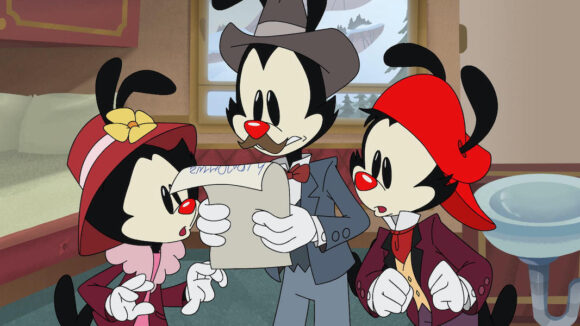

‘Animaniacs’ Reboot Review Roundup: Critics More Impressed With The Visuals Than The Humor
The 1990s nostalgia bandwagon trundles on. Twenty-two years (almost to the day) since the show ended its original run, Animaniacs mark two has debuted on Hulu. The reboot has received a two-season, 26-episode order from the streamer; the first 13 episodes are available to watch now and the second batch will premiere next year.
Some aspects of the new production are familiar, some new. The core voice cast has returned: Rob Paulsen, Jess Harnell, Tress MacNeille, and Maurice LaMarche are voicing Yakko (and Pinky), Wakko, Dot, and the Brain respectively. The earlier series’ broader array of characters, however, are gone.
So are most of the original writers and indeed the show’s creator Tom Ruegger, who was not invited to take part in the production (to his chagrin). The new showrunners are veteran Family Guy producer Wellesley Wild and Gabe Swarr (El Tigre: The Adventures of Manny Rivera, The Penguins of Madagascar), who is leading the artistic side of the show.
In terms of design, the reboot is pretty faithful to the Animaniacs of the nineties. The crew recently spoke at length about the visual development at the Ottawa Int’l Animation Festival, noting that they drew inspiration particularly from the old episodes animated by Japan’s TMS Entertainment Co. Read our report on the talk here.
Animaniacs originally launched on Fox Kids in 1993, eventually moving to the now-defunct The WB, where it ended in 1998. A direct-to-video movie, Wakko’s Wish, followed in 1999. The series was produced by Steven Spielberg’s Amblin Entertainment in association with Warner Bros. Animation.
Spielberg returns as executive producer of the new series. Sam Register, president of Warner Bros. Animation and Warner Digital Series, and Amblin Television co-presidents Justin Falvey and Darryl Frank are also serving as executive producers.
Reviews of the reboot so far range from mixed to negative, with critics generally disappointed by the writing and especially the humor, while praising the visuals. Here’s what they’re saying:
In Variety, Caroline Framke writes that she found the series a little too aggressively self-aware:
If you don’t think about it too hard, this Animaniacs reboot at least looks and sounds an awful lot like its predecessor, with its Looney Tunes music cues and elastic shenanigans. Occasionally, it hits on a smart way to update the old sensibility in a way that makes perfect sense, particularly when it switches up the animation style to explore a different world. But more often than not, its focus on how messed up the world is now gives 2020’s Animaniacs more of a sour aftertaste that keeps it from being as effervescent as it once was, and could be.
Daniel Fienberg praises the animation in The Hollywood Reporter, but adds that the sketches often feel loose and overly long:
The animation itself, polished to an HD sheen, is better and more versatile than ever; an otherwise so-so installment gets a big boost from shifting to anime for a couple of minutes. But I don’t recall ever feeling like an Animaniacs segment was tedious before.
Alan Sepinwall laments the show’s ineffective satire in Rolling Stone:
Wild and the new writers are clearly aware of what made the old show special, but they’re too wrapped up in bringing the characters into contemporary America to do those things … There’s also the matter of animation’s long lead time making many of the references feel dated. At one point while discussing politics, Yakko says, “At least, we think there’s still a President Trump. The writers are writing this in 2018.”
While agreeing that the satire feels scattershot, The A.V. Club‘s Danette Chavez finds things to enjoy:
When Animaniacs remembers to have fun, it makes for lively, occasionally impressive, viewing. The show teases fans who might be expecting great, geography-based songs on multiple occasions while also bringing back composers Steve and Julie Bernstein to provide spirited new arrangements. The premiere, one of the stronger episodes, features a toe-tapping number led by Yakko about the entertainment industry’s relentless repurposing of intellectual property. The music remains one of the best features of the show, and the voice cast is in fine form.

.png)